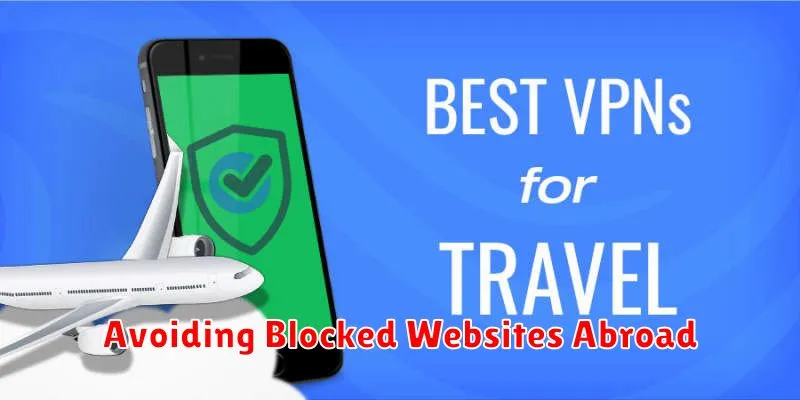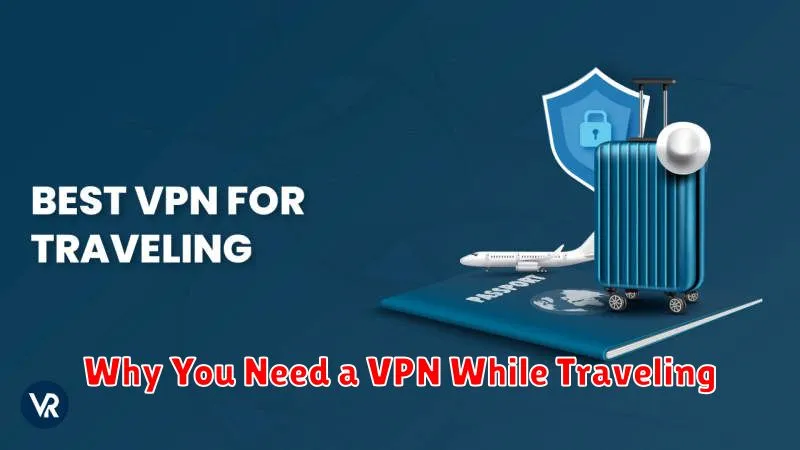Traveling often involves connecting to public Wi-Fi networks in airports, hotels, and cafes. While convenient, these networks are often unsecured, leaving your sensitive data vulnerable to hackers and cybercriminals. A Virtual Private Network (VPN) encrypts your internet connection, creating a secure tunnel for your data and protecting your online privacy while you’re on the go. Using a VPN while traveling is crucial for safeguarding your personal information, financial details, and online accounts from potential threats. Ensure a safe and secure travel experience by making a VPN an essential part of your travel preparations.
Protecting yourself against cyber threats while traveling is paramount. A VPN acts as your online shield, masking your IP address and encrypting your internet traffic, making it virtually impossible for hackers to intercept your data. Whether you’re accessing online banking, checking social media, or simply browsing the web, a VPN provides an added layer of security and peace of mind. Don’t compromise your online security while exploring new destinations. Invest in a VPN and enjoy a worry-free travel experience knowing your digital footprint is protected.
How Public Networks Expose Your Data
Public Wi-Fi networks, while convenient, often lack robust security measures. This makes them prime targets for cybercriminals seeking to intercept your data. When you connect to an unsecured network, your online activity, including passwords, financial information, and personal details, could be exposed to eavesdropping.
These networks often lack encryption, meaning data travels in plain text, easily readable by anyone with the right tools. Malicious actors can also set up fake Wi-Fi hotspots mimicking legitimate ones, tricking you into connecting and handing over your information.
What a VPN Does to Protect You
A Virtual Private Network (VPN) acts as a secure tunnel for your internet traffic while traveling. It encrypts your data, making it unreadable to prying eyes on public Wi-Fi networks. This shields sensitive information like passwords and financial details from potential hackers.
VPNs also mask your IP address, replacing it with one from the VPN server’s location. This prevents websites and services from tracking your online activity and building a profile based on your real location. It effectively grants you online anonymity and allows you to bypass geographical restrictions.
Choosing the Right VPN for Travel
Selecting the right VPN for your travel needs requires careful consideration of several key factors. Security is paramount, so look for a VPN with robust encryption protocols like AES-256. Server location is also crucial for accessing geo-restricted content. A VPN with a wide server network offers greater flexibility.
Speed is essential for seamless browsing and streaming, so check for VPNs known for fast connections. Consider the logging policy; a no-logs policy ensures your online activity remains private. Finally, price and device compatibility should align with your budget and travel devices.
Avoiding Blocked Websites Abroad

One of the most frustrating experiences while traveling is encountering geo-restrictions. Many websites and online services are blocked in certain countries due to licensing agreements or censorship. This can prevent you from accessing your streaming subscriptions, online banking, or even social media platforms.
A VPN allows you to bypass these restrictions by masking your true location. By connecting to a VPN server in a different country, you can make it appear as if you are browsing from that location, thus regaining access to your favorite websites and services. This ensures uninterrupted access to the content you rely on, regardless of your physical location.
Using VPNs to Access Streaming Safely
Maintaining access to your streaming subscriptions while traveling can be challenging due to geo-restrictions. A VPN allows you to connect to a server in your home country, effectively masking your real location. This allows you to bypass these restrictions and access your usual streaming content.
Security is another key benefit. Using public Wi-Fi networks, common while traveling, can expose your data to cyber threats. A VPN encrypts your internet traffic, safeguarding your personal information and streaming activity from prying eyes.
Security for Banking and Private Info
When traveling, using public Wi-Fi poses a significant risk to your sensitive data. These networks are often unsecured, making your banking details and private information vulnerable to cybercriminals. A VPN encrypts your internet connection, creating a secure tunnel that protects your data from prying eyes. This is crucial for accessing online banking and making transactions safely while on the go.
By masking your IP address, a VPN adds an extra layer of security, making it significantly more difficult for hackers to intercept your sensitive information. This protection ensures your financial and personal details remain private, even on unsecured networks.
Tips for Setting Up Before Departure
Subscribe to a reputable VPN service. Research providers carefully, comparing features like server locations, security protocols, and logging policies.
Download and install the VPN app on all your devices. This includes laptops, smartphones, and tablets. Ensure the app is updated to the latest version.
Test your VPN connection before you leave. Connect to a server in a different location and confirm it’s working correctly. This will allow time to troubleshoot any issues before your trip.
Familiarize yourself with the VPN app’s interface. Knowing how to quickly connect and disconnect, or switch servers, will be beneficial while traveling.

